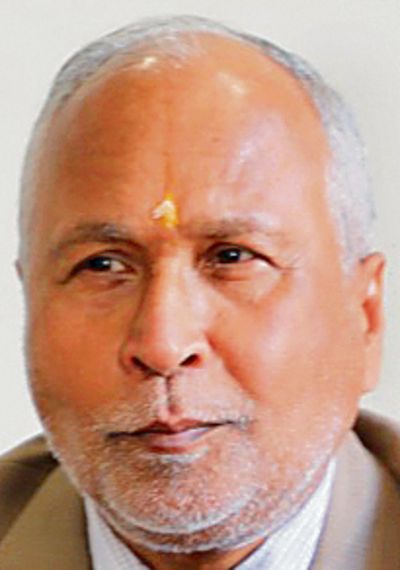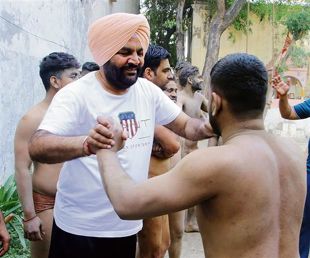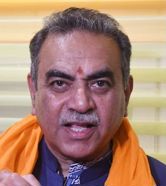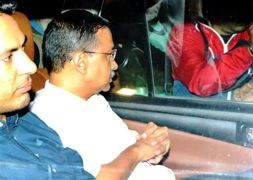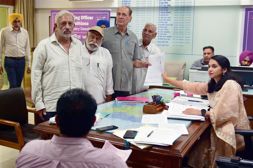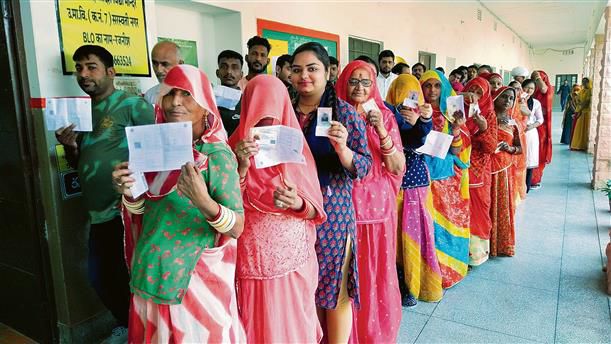
For greater good: Elections are opportunities for the electorate to decide which party can better articulate the aspirations of the public. ANI
Raghavendra P Tiwari
Vice-Chancellor, Central University of Punjab
THE most vibrant form of democracy is governance through elected representatives, and elections are the best way to elect such representatives. This year is crucial for democracy as more than 50 countries, covering nearly half of the population of the world, will go to the polls. This is significant for taking new initiatives for strengthening the civilisational discourse and inclusive development narratives in all aspects of human endeavours, be it economic growth, sustainable development, affordable quality education and health, climate change mitigation, emerging technology usage, human rights, territorial integrity, international relations and peace, etc, in a highly volatile world. Poll-bound India, which is considered the mother of democracy, is among the largest democracies.
We should bear two fundamental things in mind at this juncture: firstly, whether electability alone should be the criterion for political parties to select candidates, and secondly, whether electorates would cast their votes solely for the purpose of electing or rejecting contestants.
The electorate should ponder whether the selection of candidates should entirely be based on the electability factor and whether the casting of votes is solely for the purpose of electing one nominee and rejecting others. Experience in public life, popularity among the masses for good causes, honesty, integrity, transparency, commitment to the public good and nation-building attributes should form the basis for the selection and rejection of candidates as representatives. The elected representatives should be competent enough to set a development agenda and advocate for it. They should be able to articulate the aspirations of the public for inclusive and sustainable development.
Elections are opportunities for an electorate to decide which party can better articulate the aspirations of the public, can take better decisions for public good, enact better laws for good governance, frame and execute better policies and programmes for inclusive and sustainable socio-economic growth and influence the worldview for sustainable development. Polls are also an occasion for the public to endorse its historical, cultural, defence and environmental preferences. The best social security model, and not the one packed with freebies, should get preference in the selection of representatives. This would encourage healthy competition among political outfits in terms of policy formulation and programme implementation for public welfare. Most importantly, elections are an occasion for the expression of choices in terms of social, emotional, intellectual, spiritual, patriotic and pluralistic quotients. Such considerations should be the guiding principles in the selection or rejection of candidates by parties and electorates. It is widely believed that ‘we elect the government we deserve’. Therefore, candidates should be thoroughly screened and assessed with respect to such attributes during campaigns. An unblemished reputation, a zeal to do public good, the ability to govern in the fairest manner and the capability to think and innovate should prominently figure in the thought process of parties and voters while choosing candidates and casting votes.
It appears that the right to abstain — the provision of NOTA (none of the above) — has not served its purpose. NOTA has not forced political parties to evolve better criteria for the selection of candidates, implying that the parties and candidates have not learnt any lesson from this provision. One of the best pieces of voting advice has come from Singaporean doctor Paul Tambyah: “Voting is not a marriage. It is public transport. You are not waiting for ‘the one’… You are getting on the bus. And if there is not one going exactly to your destination, you do not stay home and sulk. You take the one that is going closest to where you want to be.” The message is loud and clear: the best option is not to abstain but to elect the candidate with a policy orientation most closely aligned to your own. Earlier, parties selected candidates on the basis of caste, community, language, influence and financial resources — all euphemistically called the ‘winnability factor’. However, the selection of candidates and voting patterns based on such considerations is detrimental to democracy, which is all about exercising choices in the most unbiased manner. It would be prudent to provide a common platform for all candidates to share their development agendas with the electorate.
The media plays a crucial role in educating voters. The quality of debates in electronic, print and social media has a huge impact on the psyche of the voters. Therefore, elections are opportunities for the media to refrain from spreading misinformation, disinformation and fake or paid news. The press ought to reflect ground realities on issues confronting the voters and help them select the best candidates. Those in public life seeking renomination must educate the public about the healthy traits of elections and democracy. They should present an alternative model of development and governance during the election campaign and offer themselves for performance reviews.
Some voters develop disengagement from the electoral process and refrain from voting, thinking that their ballot does not matter. How can we overcome this defeatist attitude and encourage voters to participate in elections and uphold democratic values? One way would be to consider that voting is not merely a right but also a duty to perform. Inaction on the part of the electorate may lead to severe consequences in terms of the election outcomes and governance, and the blame for electing an unfit government will also have to be equally shared by even those who did not cast their votes. Complacency on the part of the rich, as popular belief goes that the poor vote while the rich do not, is liable to get our democratic system derailed. Scores of our national heroes made sacrifices for making India the mother of democracy. Casting the vote, therefore, is an important way to honour the values and high morals they strived for. Such considerations may eventually lead to an increase in the turnout and, thereby, people’s participation in government formation.
This parliamentary election is, thus, a chance for us to set higher ideals of the democratic process for the world to emulate.
Join Whatsapp Channel of The Tribune for latest updates.






